Pre-Race Coverage:
What To Expect: MarathonGuide.com's Preview |
IAAF's Preview
Race/Athlete Profiles: The Favorites
Facts/Figures/Lists: Past Athlete Performances | Starting Lists
Extras: Video Coverage
2008 Olympic Games - Beijing - Men's Marathon Contenders
by Sharon Ekstrom
The Kenyans:
Martin Lel |
Samuel Wanjiru |
Luke Kibet
The Moroccans:
Jaouad Gharib |
Abderrahim Goumri
The Americans:
Ryan Hall |
Dathan Ritzenhein |
Brian Sell
The Ethiopians:
Deribe Merga |
Tsegaye Tebede
The Eritreans:
Yared Asmeron |
Yonas Kifle
Other Runners Of Note:
Atsushi Sato |
Viktor Rothlin |
Mubarak Hassan Shami |
Stefano Baldini
THE KENYANS
Kenya, a nation famous for its distance runners, has never won a gold medal in the marathon. A random selection process by Kenyan Athletics may have been a detriment to the men's Olympic team for several years. Eric Wainaina had represented Kenya well in the men's marathon distance at the 1996, 2000 and 2004 Olympic Games winning bronze at Atlanta and silver in Sydney; but Wainaina was not the fastest Kenyan with the likes of several sub 2:08 marathoners in the running circuit at the time like Paul Tergat, Martin Lel, Evans Rutto and Felix Limo to name a few. For the 2008 Kenyan team three all-stars were selected.
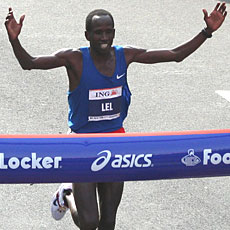 MARTIN LEL MARTIN LEL
Three-time London Marathon winner Martin Lel (KEN) is the fourth fastest man in the world who trains in Eldoret, Kenya with former World Record Holder Paul Tergat and four-time Boston Marathon winner Robert Kipkoech Cheruiyot. Lel has had strong performances at Boston, London and New York City Marathons; but it was 2007 when he started a marathon winning streak at the 2007 London Marathon in 2:07:41, 2007 New York City Marathon in 2:09:04 and the 2008 London Marathon in a personal best of 2:05:15. Lel is not only a strong runner on challenging courses; he is a marathoner who can put out a strong finishing kick to defeat the toughest of rivals on fast courses.
Why? Lel has always placed in the top three at every marathon he has run. Lel who has raced marathons with and without pacers has the experience and the know-how to fare well in Beijing. Despite the strong Kenyan field, fellow countryman and elite marathoner Felix Limo predicts Lel for gold. "Lel has the patience and consistency it takes to win."
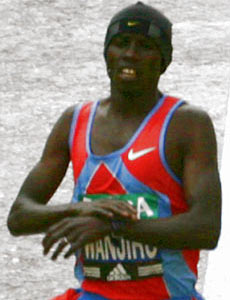 SAMUEL WANJIRU SAMUEL WANJIRU
"Sammy" Wanjiru, ran the third fastest debut marathon of all time at the 2007 Fukuoka Marathon winning in a time of 2:06:39. At twenty-one years of age, this Half Marathon World Record Holder was confident from his debut, making a bold statement that he would break Haile Gebselassie's world record of 2:04:26. Wanjiru has yet to do so, but proved he is a force to be reckoned with at the 2008 London Marathon where he battled it out against Martin Lel and Abderrahim Goumri, taking second place in 2:05:24 coming in under course record time. Perhaps third time is the charm. Wanjiru trains in Japan under the tutelage of 1992 silver medalist Koichi Morishita.
Why? Wanjiru is a newcomer with lots of spirit. This talented Kenyan who continues to break records has the athletic ability of the Kenyan elites and the mental agility of the Japanese from his training in Japan. If Wanjiru does not get caught up in the excitement of this esteemed race, he will medal and possibly win gold.
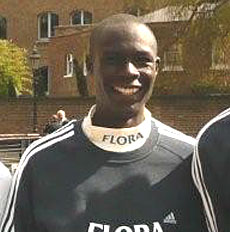 LUKE KIBET LUKE KIBET
Luke Kibet won the gold medal at the 2007 World Championships in Osaka marking the first time a Kenyan had won World Championship marathon in ten years. Kibet, whose personal best of 2:08:52 from Eindhoven in 2005, skipped a few weeks of training in December of 2007 when violence broke out following the Presidential elections and an angry mob attacked him with stones. Yet, Kibet recovered and persevered. He ran the 2008 London Marathon and was selected as an alternate on an already powerful Kenyan marathon team. Kibet did not feel slighted by Kenyan Athletics selection and diligently began his own preparations for the 2008 Berlin Marathon. With Kipkoech Cheruiyot's last minute withdrawal from the Beijing Olympics, Kibet is excited to represent Kenya at the Beijing Games.
Why? Kibet is still growing into the marathon distance. Kibet toes the line between A-standard and B-standard levels of marathon elites, but the young runner's win of the World Championships in sweltering conditions could be indicative of what a persistent young runner can achieve given the wild card of what Beijing weather could be.
THE MOROCCANS
Morocco has a history running of legends, none more famous than middle distance runner Hicham el Guerrouj, Abdelkader El Mouaziz or former Moroccan national Khalid Khannouchi; but expect Jaouad Gharib and Abderrahim Goumri to make waves at the 2008 Beijing Olympic men's marathon.
JAOUAD GHARIB
Jaouad Gharib has run five career marathons under 2:08, not bad for an athlete who started his running career at age twenty-two inspired by the Marrakesh Marathon on television. His resume also includes gold medal wins at the 2003 and 2005 World Championships. Despite a number of top four finishes at the London Marathon, Gharib has a personal best of 2:07:02 at the 2004 staging of the event. In 2007 Gharib's aggressive tactics backfired with a final surge in the last 600 meters of the London Marathon, but he faded quickly earning him a fourth place finish rather than first. Gharib had a near photo finish with Patrick Ivuti (KEN) at the oppressively hot 2007 Chicago Marathon, but lost the race in tenths of seconds. Gharib has not run a marathon since.
Why? Although times and numbers are important when looking at the history of elite runners, the performances can not be forgotten. Gharib is an aggressive runner who does not shy away from pushing the pace and challenging the pack. If his timing is right, a hard surge at a key point of the race will guarantee him a win.
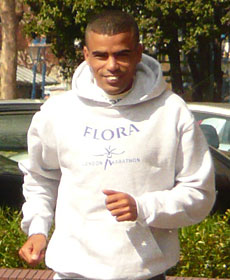 ABDERRAHIM GOUMRI ABDERRAHIM GOUMRI
Abderrahim Goumri had an impressive marathon debut year in 2007. At the 2007 London Marathon, Goumri hid in the lead pack while Gharib and Hendrik Ramaala (RSA) did the bulk of the work. Taking advantage of the strategy in the last 600 meters of the race, Goumri battled it out against Martin Lel; but was unable to hold the final sprint losing to Lel by three seconds. 2:07:44 was not shabby for a debut. Goumri followed Lel to the 2007 New York City Marathon where he once again flew under the radar until the last miles of the race. Unintimidated, Goumri surged dropping Ramaala and James Kwambai (KEN) from the lead pack. In what appeared to be a two-person race, Goumri and Lel raced the last mile, but Goumri was outkicked in the final 500 meters. At the 2008 London Marathon Lel and Goumri were at it again, but this time Sammy Wanjiru was in the mix. Lel and Wanjiru outsprinted the Moroccan in the last 500 meters, all three smashing the course record. Goumri's time of 2.05:30 makes him the sixth fastest man in the world.
Why? Goumri has always flown under the radar, yet remains one of the best challengers to the top Kenyan runners. If Goumri really works on reserving energy for a final kick, he will finally win.
THE AMERICANS
The U.S. Men's Olympic Marathon team has been highly documented in the media since the Olympic Trials in New York City, when three newcomers to distance running - Ryan Hall, Dathan Ritzenhein and Brian Sell - upset veteran marathoners from the 2004 Athens Games Meb Keflezighi (silver medalist), Alan Culpepper and Dan Browne and favorites Abdi Abdirahman and Khalid Khannouchi to qualify for the 2008 U.S. Team to Beijing. The roster shows lots of promise for the Beijing Games and for the future of male marathoners in the US.
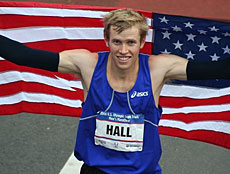 RYAN HALL RYAN HALL
When twenty-five year old Ryan Hall began racing in 2007, he meant business. His half marathon debut at the Houston Half Marathon smashed the American record in 59:43. The previous record for twenty-one years was 60:55. Hall wasted no time and jumped into the marathon distance in the high caliber 2007 London Marathon setting the fastest American debut in 2:08:24. When Hall pulled into the lead pack at mile seventeen, he proved to the international field that he was one to watch. Hall's second career marathon was at the 2008 U.S. Men's Olympic Team Trials where he ran the challenging criterium course with ease; winning the event in 2:09:02, a time faster than Martin Lel won the 2008 New York City Marathon the following day. Hall remains an unstoppable force. At the 2008 London Marathon he ran to a fifth place finish in a time of 2:06:17 amidst a field of top African runners. Hall is in the shape of his life and ready to take on the field in Beijing.
Why? If finish times are proof of what a runner is capable of, Ryan Hall's short list of career marathon finishes are impressive enough for international athletes to take notice. As the favorite American going into the Beijing Games, Hall has the wherewithal to hang in the lead pack and the mental strength to run the entire race solo if need be. If Hall's performance in Beijing does not impress, he has plenty of years ahead of him to do so.
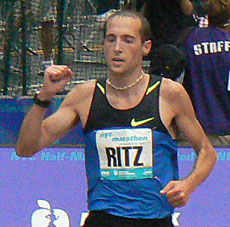 DATHAN RITZENHEIN DATHAN RITZENHEIN
Dathan Ritzenhein and Ryan Hall share a few similarities…both are twenty-five and both will be running for the United States of America at the 2008 Beijing Olympics. Ritzenhein has been on the Olympic peripheral for some time, in fact, since college. Qualified for the 10,000 meters at the 2004 Athens Games, a stress fracture to the third metatarsal in his left foot forced him to drop out during the event. A constant recurrence of the injury has haunted him since. When healthy, Ritzenhein's talent in cross country and on the roads is evident. He debuted in the marathon distance at the 2006 New York City Marathon placing 11th in a 2:14:01; but returned to the 2008 U.S. Men's Olympic Trials where he came in second in a time of 2:11:07. Ritzenhein had withdrawn from several road races including the Great North Run, World Cross Country Championships, and the Healthy Kidney 10K in New York City, following a win of the U.S. Cross Country Nationals in the start of 2008.
Why? Ritzenhein's dedication to the sport and fortitude to stick with running despite being plagued by injuries displays sheer determination of seeing his goals through fruition. Ritzenhein's talent may shine through in Beijing as he comes of age in his third career marathon.
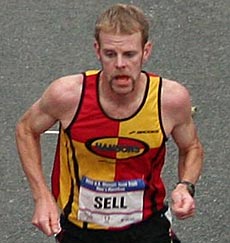 BRIAN SELL BRIAN SELL
Rounding out the U.S. Olympic team is Brooks-Hansons athlete Brian Sell whose strength and endurance through the years has paid off. For an elite athlete who works a day job and never trains at altitude, Sell is a quality runner that has won the respect of the running community. 2006 was a stellar year with a fourth place finish at the Boston Marathon in 2:10:55, followed by a personal best of 2:10:47 at the 2006 Chicago Marathon. Close to having quit professional running to become a dentist, Sell took the third place on the team with a 2:11:40 at the 2008 U.S. Olympic Trials in New York City.
Why? Aside from his very cool, signature chops he sports for good luck; Sell is a humble guy who put in years of hard work to get to where he is now. No frills or fancy training techniques, Sell is old school running.
THE ETHIOPIANS
Ethiopia first took part in the Olympics at the 1956 Melbourne Games and Seargent Bashaye Feleke ran the men's marathon; but the nation had not burst into the distance running scene until Abebe Bikila broke the marathon record with a 2:15:16 while barefoot at the 1960 Rome Games, winning the first gold medal for Ethiopia. Bikila went on to win the 1964 Tokyo Marathon. Bikila's Olympic Marathon career was plagued by injury, but fellow countryman Mamo Wolde stepped up to win gold at the 1968 Mexico Olympics and bronze at the 1972 Munich Games. For the next decade or so Ethiopia boycotted the 1976, 1984, 1988 Olympics. In 1996 Haile Gebrselassie came onto the scene winning the gold medal in the 10,000 meters at the Atlanta Games. It wasn't until six years later that Gebrselassie took to the 26.2 mile distance. But Ethiopians continued to medal at the Olympic Games. In 1996 Fatuma Roba won gold medal in Women's Marathon while rising athlete Gete Wami got a bronze medal in 10,000 meters. At the 2000 Sydney Games Ethiopians dominated the distance races on track and roads, Gezahegn Abera got a gold in the marathon and Derartu Tulu who won gold medals in marathon, 5,000 and 10,000 meters respectively; whereas, Gete Wami snatched silver and bronze medals in 10,000 and 5000 meters. At the 2004 Athens Olympics Ethiopians picked up several medals on the track, but none in the marathon. For 2008 the Ethiopians are back. Although world record holder in the marathon Haile Gebrselassie opted out of the marathon, Deribe Merga and Tsegaye Kebede will represent Ethiopia well.
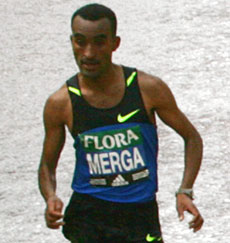 DERIBE MERGA DERIBE MERGA
With a resume nowhere nearly as extensive as running legend Haile Gebrselassie, Deribe Merga, a newcomer to the marathon distance, debuted at the 2007 Paris Marathon finishing in tenth place in 2:13:33. Whether its beginners luck or a taste of what's to come, Merga bettered his marathon time with a second place finish of 2:06:50 at the December 2007 Fukuoka Marathon, finishing ten seconds after Half Marathon World Record Holder Sammy Wanjiru. Merga went onto challenge himself with the high caliber field of the 2008 London Marathon. A sixth place finish in 2:06:38, a personal best, was nothing to scoff at.
Why? Merga is an emerging talent. Although he has more to learn about the distance, he is a worthy contender if he can continue to improve.
TSEGAYE TEBEDE
At twenty-one years of age, Tsegaye Tebede will be running his third career marathon at the 2008 Beijing Games. His debut at the 2007 Amsterdam Marathon was an eight place finish in a time of 2:08:16; but his improvements less than one year later are impressive. Tebede was second at the 2008 Ras Al Khaimah Half Marathon losing to Patrick Makau (KEN) by tenths of a second in a finish of 59:35. He went on to win the 2008 Paris Marathon in a 2:06:40.
Why? While fresh legs can give Tebede an edge over the veteran field, perhaps primary incentive will be the age old rivalry between Ethiopia and Kenya.
THE ERITREANS
Eritrea which became independent from Ethiopia in 1993 may be best known to those in the running community as the birthplace of American distance runner and Athens silver medalist Meb Keflezighi. It is also where two of the nation's top runners, Yared Asmeron and Yonas Kifle, hail from.
YARED ASMERON
It was not so long ago that Yared Asmeron was a 2:15 marathoner. In fact, in 2007 his fastest finish was a 2:15:14 from the Hamburg Marathon. Yet, at the 2007 World Championship in Osaka Asmeron came in fourth after Luke Kibet (KEN), Mubarak Hassan Shami (QAT) and Viktor Rothlin (SUI). He had a great start in 2008 with a second place finish of 2:08:34 at the Lake Biwa Marathon.
Why? Asmeron's improvements have been outstanding and given the right conditions he may have contention to medal.
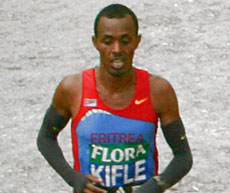 YONAS KIFLE YONAS KIFLE
Cross country specialist Yonas Kifle holds the Eritrean National Record from his fifth place finish of 2:07:34, his debut in the distance at the 2007 Amsterdam Marathon. In his second career marathon Kifle came in seventh at the 2008 London Marathon, finishing in a 2:08:51.
Why? Kifle like Asmeron will be flying under the radar at the Beijing Games. In conditions where the fastest marathoner may not be the winner, Kifle despite never running a marathon slower than 2:09 has a shot at medal contention in a race where weather can be a wild card.
OTHER RUNNERS OF NOTE:
ATSUSHI SATO
Japan has a long history of notable distance runners. While Japanese women have won medals at the last four Olympics and more notably gold in 2000 and 2004, Japanese men have not won a medal since Koichi Morishita's silver in the 1992 Barcelona Olympics. The Japanese men's team for the Beijing Games holds much promise with runners like Atsushi Sato who is rarely seen outside the Asian running circuit, if only for World Championship races. Half Marathon Japanese record holder Atsushi Sato had a strong 2007 despite an injury earlier in the year. He set the Asian half marathon record of 60:25 at the World Road Running Championships in Udine. He came in second at the 2007 Beppu-Oita Marathon and third at the 2007 Fukuoka Marathon in a personal best time of 2:07:13 behind Sammy Wanjiru and Deribe Merga.
Why? Sato is capable of restoring his nation's faith in their men's marathon team. Although his altitude training was cut short due to signs of fatigue, if recovered well Sato will be a major contender in Beijing.
VIKTOR ROTHLIN
At thirty-four years old, Viktor Rothlin (SUI) has continued to improve in the marathon distance over the past ten years. Having averaged a 2:11 finish at several career marathons, Rothlin mainly raced on the European circuit except for a few championships races such as the 2000 Sydney Games and the 2004 Athens Games at which he DNF. It is Rothlin's recent improvements which have been head turning. In 2007, Rothlin ran to victory setting a national record in 2:08:20 at the Zurich Marathon. He later tackled the high caliber field at the 2007 World Championships in Osaka and collected a bronze medal in oppressively hot conditions. His string of successful performances continued into 2008 with a win of the Tokyo Marathon in a personal best of 2:07:23.
Why? Rothlin is on a roll with a string of recent successes. Rothlin spent some time in the Rift Valley in Kenya in December to prepare for Beijing. Unfortunately, he had to cut his training short, having been evacuated due to rioting and political unrest. If Rothlin's performance at the 2008 Tokyo Marathon in February is indicative of his fitness levels, he is certain to stand out in Beijing.
MUBARAK HASSAN SHAMI
Mubarak Hassan Shami (QAT), formerly Kenyan-born Richard Yatich, has won nearly every marathon he's ever participated in, which is impressive for a twenty-seven year old. Predominantly a road racer, this half-marathon specialist won silver at the 2005 World Championships beating out Yonas Kifle and Yared Asmeron. Out of his seven career marathons, highlights include a 2:09:22 finish at the 2005 Venice Marathon, a 2:07:19 from the 2007 Paris Marathon and a 2:08:23 victory of the 2008 Lake Biwa Marathon. Shami is one to watch, as the one exception to his winning streak was a silver medal at the 2007 World Championships in Osaka.
Why? Shami's 2:07:19 finish in Paris was the tenth fastest time in 2007 and brings the runner into the top levels of competitive marathon running. In a race where weather can be the wild card, Shami who has had more experience racing in Asia may just be dark horse in Beijing.
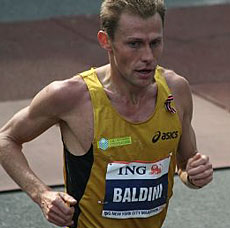 STEFANO BALDINI STEFANO BALDINI
Stefano Baldini (ITA) is a marathon specialist not only for the number of marathons he has run, but the quality of how he has run them. With thirteen sub-2:10 marathons under his belt, Baldini has finished most marathons in the top ten. His extensive resume features most notably a gold medal from the 2004 Athens Games marathon. From track star to World Half Marathon Champion to avid marathoner, thirty-seven year old Baldini has a personal record of 2:07:22 from the 2006 London Marathon and is still going strong.
Why? From a DNF at the 2000 Sydney Games to a gold at the 2004 Athens Games, Baldini who has been racing marathons since 1995 is one to never let the 26.2 mile distance get the better of him. His patience and talent won him gold in 2004, if conditions are bad enough Baldini is happy to take on the challenge and confident that he can repeat. (At press time, Baldini is contemplating a withdrawal from the games having injured a thigh muscle and taking days off training since last Friday.)
| 













